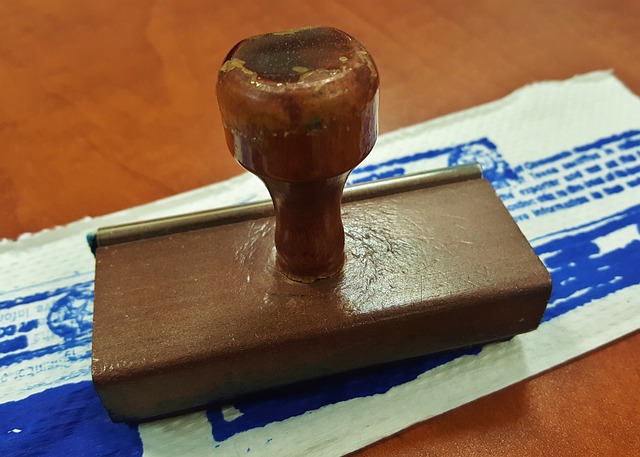Notarial acts demand meticulous attention to detail, as any oversight can lead to significant legal consequences. This article explores the crucial role of liability insurance and bonds in safeguarding notaries from claims and ensuring ethical practices. By understanding the scope of a notary’s responsibilities and the potential risks, professionals can minimize errors, maintain document certification integrity, and comply with notary law and ethics. We delve into Errors and Omissions (E&O) insurance, the purpose it serves, and its benefits in protecting against notary claims. Additionally, we discuss the role of a notary bond in providing financial guarantees and mitigating legal risks.
- Notary Responsibilities and Legal Liability
- – The scope of a notary's duties and responsibilities
- – Potential legal implications of notarial acts
- – Importance of strict attention to detail in notarial procedures
Notary Responsibilities and Legal Liability

Notaries have significant responsibilities when it comes to notarial acts. They are tasked with ensuring the authenticity and legality of documents by witnessing signatures, administering oaths, and performing other official duties. Their role involves handling sensitive information and carrying out tasks that require meticulous attention to detail to avoid any legal complications.
Legal liability is a crucial aspect of notary responsibilities. Any negligence or misconduct in notarial acts can lead to serious consequences, including notary claims and potential legal disputes. Therefore, it’s imperative for notaries to have liability insurance, such as Errors and Omissions (E&O) insurance, which shields them from financial loss due to professional errors or omissions. Furthermore, maintaining a notary bond reinforces their commitment to ethical practices and provides an additional layer of financial protection in case of malpractice claims.
– The scope of a notary's duties and responsibilities

Notaries have a multifaceted role in legal and administrative processes. Their primary duty is to witness and authenticate signatures on various documents, ensuring the authenticity and integrity of signatures. This involves a deep understanding of notary law and ethics, as they must verify the identity of signers and ensure they understand the implications of their actions. Notary responsibilities extend beyond signature verification; they also include preparing and issuing affidavits, administering oaths, and performing other official acts as mandated by local or state laws.
The scope of a notary’s duties necessitates meticulous attention to detail and adherence to strict ethical standards. Any negligence or misconduct can lead to serious legal implications and notary claims. To safeguard against such risks, it is imperative for notaries to secure liability insurance, commonly known as Errors and Omissions (E&O) insurance. This coverage protects them from financial loss in the event of claims of notarial malpractice, providing a crucial financial guarantee that underscores their commitment to ethical practices in document certification processes.
– Potential legal implications of notarial acts

Notarial acts carry significant legal implications, as any oversight or mistake can lead to substantial notary claims and potential legal liability. Notaries are responsible for certifying documents with precision and integrity, ensuring that the information is accurate and the signatures are authentic. Failure to adhere to these standards can result in disputes, lawsuits, and financial burdens.
Liability insurance, particularly Errors and Omissions (E&O) coverage, plays a pivotal role in mitigating these risks. It provides financial protection against claims of notarial misconduct or malpractice, shielding the notary from costly legal battles and settlements. Additionally, maintaining a notary bond further reinforces ethical practices by offering a financial guarantee that the notary will fulfill their duties honestly and competently. Adhering to these precautions is crucial for ensuring the integrity of document certification processes under notary law and upholding professional ethics.
– Importance of strict attention to detail in notarial procedures

Notaries public play a crucial role in ensuring the integrity and authenticity of legal documents. Their duties encompass a range of responsibilities, from witnessing signatures to certifying the validity of papers. Given the sensitivity of their tasks, strict attention to detail is paramount. A single oversight or mistake can lead to serious legal implications, including charges of notarial misconduct and malpractice. Notaries are therefore advised to adopt meticulous practices in every step of notarial acts, from initial document examination to final certification.
Liability insurance, such as Errors and Omissions (E&O) coverage, serves as a critical safety net against potential notary claims. It shields them from financial loss should errors or omissions occur in their official duties. Alongside liability insurance, maintaining a notary bond is essential. This financial guarantee underscores the notary’s commitment to ethical practices and adherence to Notary Law, further minimizing risks associated with notarial procedures and protecting both the notary and those they serve.
Notaries play a crucial role in document certification processes, ensuring legal integrity and accuracy. By understanding their responsibilities and the potential risks involved, such as notary claims, they can safeguard against legal liability. Securing liability insurance, like Errors and Omissions (E&O) coverage, is an essential step to protect against financial loss due to negligence. Maintaining a notary bond further reinforces ethical practices and commitment. These measures ensure that notarial acts are performed with precision and responsibility, upholding the integrity of official document certification.



